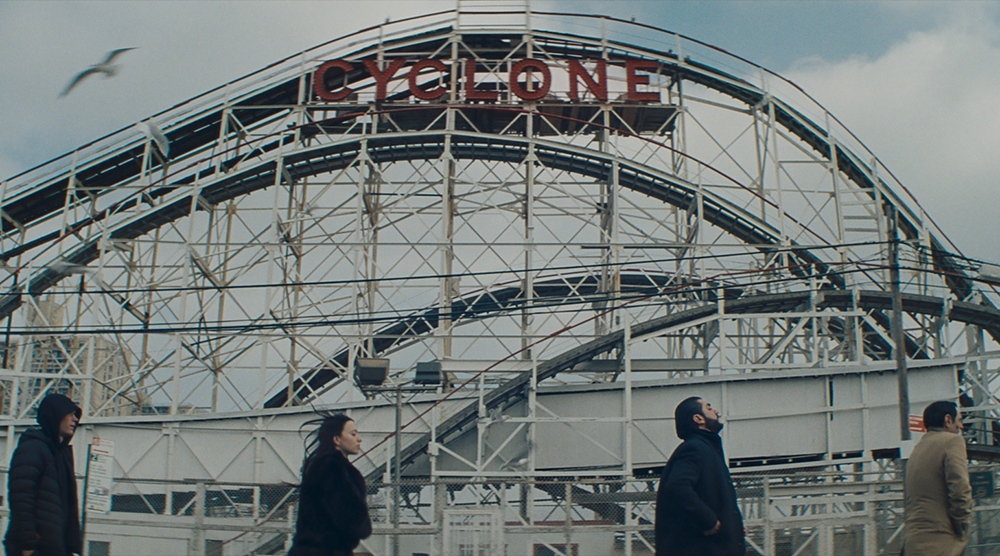Sean Baker’s “Anora” is a wild, raucous ride, sprinting across a high-wire while somehow maintaining its composure. A filmmaking style which pairs ruthless formal precision and cinéma vérité-level cuts and zags creates beauty in each frame, and Baker’s devotion to all characters—the borough of Brooklyn included—never translates to pity or familiar prototyping. Winner of the Palme d’Or—the first American film to win since 2011—“Anora” screened at the New York Film Festival last Saturday, and it’s primed to gallop into awards season, collecting admirers, unwavering praise and Oscar buzz along the way. A marvel of originality, “Anora” doesn’t so much reinvent “Romeo and Juliet,” reimagine “My Fair Lady,” or shred the script of “Nights of Cabiria” as it does set fire to all of its supposed influences, sifting through the ashes to craft a film that stays in attack mode and chases away any pat categorization.
The conceit is simple, and irresistible. A fervid, fearless Mikey Madison plays Ani (full name: Anora), an exotic dancer based in Brighton Beach. She’s introduced in a slow-mo tracking shot (to the tune of “Greatest Day”) which glides from one lap-dance customer to the next, landing on an ebullient, grinning Ani. (Cinematographer Drew Daniels gives ample life to both the crowded interiors and frigid, daunting Brooklyn beaches and boardwalk.) Is the smile genuine, or just part of the job? Ani is a consummate professional, a supportive co-worker and a bit of a pain in the ass. Still, she’s loyal, and good at what she does, so when young Ivan (Mark Eydelshteyn) requests a woman who speaks his native Russian, Ani’s grimace vanishes, she hikes up her boots and rises to the task.
A Breakneck Romance
Ivan, a giggling gamer who loves to spend his parents’ money, invites Ani over to a party at his [parents’] Brooklyn mansion after that initial visit. She’s working—so they have sex—but there’s a spark beyond the transactional relationship. So when Ivan offers Ani $10,000 to be his girlfriend for a week, she agrees to do it for $15,000. (Ani: “I’d have done it for ten.” Ivan: “You shouldn’t have settled for less than thirty.”) The breakneck courtship brings them to Las Vegas, where Ivan had chartered the family jet to gamble, party and—after some haggling—elope to Ani. Caught up in the moment—and Ivan’s promises—Ani betrays her best instincts, but it’s hard to see the downside, giving that it’s a considerable upgrade from a day job at Club HQ, and the home she shares with her sister, beneath a noisy, chattering above-ground subway line.
Taking Ani away from her girls at HQ—frenemies and rivals—does deprive us of some “Bull Durham” quality competitive banter. But a dispute with Diamond (Lindsey Normington) will resurface later, when Ivan’s on the run. Whereas the week preceding the marriage is all sparkles, shiny lights and thumping bass (This is a loud movie—see it in theaters.), the newlyweds’ honeymoon in Brooklyn is interrupted by Gornick (Vache Tovmasyan) and Igor (Yura Borisov), two glorified babysitters, who Ivan tries and fails to keep out of the house. Accustomed to Ivan’s hijinks and juvenalia (“Bro, he once swam in a pool of Kool-Aid!”) Gornick storms upstairs to take a picture of the marriage license, sending confirmation to his boss Toros (Karren Karagulian, a Baker regular). Clutching a baby and clad in a clerical robe, Toros ditches the christening and books it in his Escalade to admonish Ivan.
Frenetic, Funny, and Frightening
Problem is, Ivan panics and leaves, sprinting out half naked while Gornick falls on his ass trying to catch him. Igor is charged with keeping Ani indoors and for his troubles, he’s punched in the face and bitten on the neck. When Gornick returns, Ani’s tied up, and when Igor frees her legs, Ani kicks Gornick in the face, sending him back into a glass table, breaking the table and his nose. Toros arrives, but Ani doesn’t let up: she screams at the top of her lungs, refuses to talk, demands that she see Ivan, while Toros—frightened at what this all means for him, intimated perhaps by Ivan’s father and definitely his mother—promises that if she annuls the wedding, she’ll be paid $10,000.
That entire sequence is dazzling: it’s frenetic, funny and frightening, and Madison is incredible at conveying—with all her body and voice—a feral creature backed into a corner. It’s three against one, but the kidnapping is flubbed so badly it plays less like “Funny Games” (1997) and more like “Home Alone” (1990) via Ernst Lubitsch and Julia Ducournau. The foursome then has no choice but to join forces to find Ivan. Blind leads the blind, and Toros, the leader of the search committee group, is the most gloriously unhinged of them all. He borrows a phone (“I don’t have Instagram. I’m an adult!”) to find a picture of Ivan, interrupts a karaoke party, then brandishes the picture in the face of some strangers who are dining. His desperation is palpable and hilarious, blaming everyone except himself, and his version of the grumpy-old man “these kids!” speech is salty perfection.
A Film to See in Theaters

All roads lead back to Club HQ, where Ivan is found in a private room with Ani’s nemesis Diamond. Finally in possession of Ivan—after a brilliantly-staged brawl between Ani and Diamond—the film rollicks to the finish line, from a courtroom to Vegas and back to Ivan’s mansion, where Ani is allowed to spend one last night, before returning to her old life, complete with a massive black eye and broken heart. At this point, and only then, does the film lose steam, rushing to drop the curtain, but not before forcing some physical intimacy and tears. The delicious ensemble is reduced to Ani and Igor, and while their chemistry is credible, the wider world is shut off. And the gigantic, sprawling mess of the previous two hours is what made Baker’s world such a joy to spend time in.
Fun to Watch
Baker’s film deserves all of the accolades it has earned so far. Ditto the inevitable career boost that awaits its gifted cast and crew on the heels of this explosive, unconditional success. Madison is a star, but her support cast is stellar, and Baker deserves due credit for assembling this group, compiling the script, editing the film, and turning what appears to be an unwieldy puzzle into a taut and meticulous spectacle. Escaping a simple summary, “Anora” avoids underlining key themes or messages, and it delivers excess in all the best ways. Ani might end up in the same place she started, but it’s an entirely realistic outcome, consistent with her own hardened disposition and life experience. She’s a human being, not an angel, far from a stripper with a heart of gold, and mourning how her journey ends is a resounding tribute to how fun it was to watch.
“Anora” is playing at the New York Film Festival, which runs from September 27th – October 14th. Follow us for more coverage.



